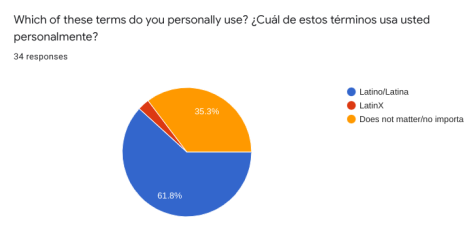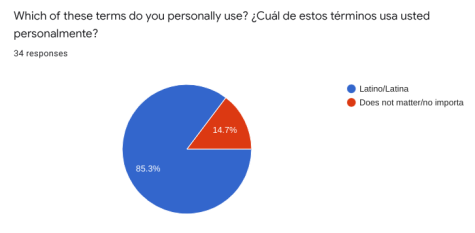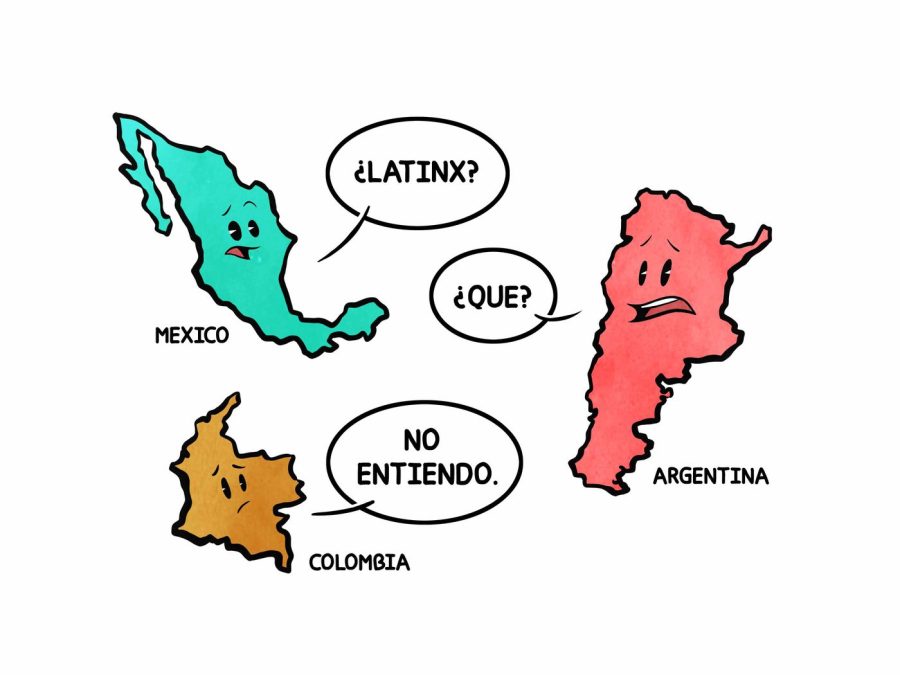‘LatinX’ sparks controversy of authenticity throughout community
Desplácese hacia abajo para leer el artículo en español.
‘LatinX’ is a term that is seen more now, whether it be to someone’s individual references or to describe large groups of Latin Americans. The term ‘LatinX’ is a gender neutral version of ‘Latino’, which is a masculine word in Spanish. Because the Spanish language is gender based, the word has caused an internal conflict in the Latin American community regarding the necessity for the term.
LatinX originated in the mid-2000s in order to have a gender inclusive variation of Latino and Latina. After the mass shooting in Orlando at the LGBTQ nightclub Pulse in 2016, the phrase was popularized to bring awareness and acceptance to gender fluidity. Although the word is used nowadays to refer to a group of people of Latin descent, according to Merriam Webster, “it has been especially embraced by members of Latin LGBTQ communities as a word to identify themselves as people of Latin descent possessing a gender identity outside the male/female binary.”
Nevertheless, some Latin Americans feel that the word goes against their culture, upbringing and beliefs. “I feel LatinX is too uncultured,” said a Parkdale student who chose to remain anonymous. “It destroys the fabric of the Hispanic culture. I feel LatinX is used by fake and Americanized Hispanics who can’t speak Spanish.”
A sample survey given to 34 Latin American Parkdale students showed that 61.8 percent believe that the term “Latino and Latina” should be used. Spanish is a gender-based language much like Hindi, French and Arabic, that not only are gender based but are masculine by default. This means that referring to a group of anything would result in the noun automatically being mascuinlne even if there are women or objects in the group. Objects in Spanish such as phone (teléfono), car (carro), and shoe (Zapato) are male nouns despite being inanimate objects.

The pronunciation of “LatinX” is also discussed since it does not make sense to some. Merriam Webster states that the term had “little consideration for how it was supposed to be pronounced when it was created.” In a survey of 34 Latin American students 85.3 percent use the terms ‘Latino’ and ‘Latina’ in their own personal lives. 14.7 percent of Latin American Parkdale students concluded that it does not matter and no one voted for the use of ‘LatinX’ in their personal lives.

On Aug. 11, 2020 Pew Research center reported, “ However, for the population it is meant to describe, only 23% of U.S. adults who self-identify as Hispanic or Latino have heard of the term Latinx, and just 3% say they use it to describe themselves.”
The current use of LatinX by Latin America is not widespread and there are even Latin Americans who have never heard the word or applied it in real life. By default these Latin Americans use the term ‘latino’ or ‘latina’ without any alternatives. One Parkdale student stated, “Sinceramente no se que es el término LatinX (I honestly don’t know what the term LatinX is.).”
En español
‘LatinX’ es un término que se ve más ahora, ya sea para referencias individuales de alguien o para describir grandes grupos de latinoamericanos. El término ‘LatinX’ es una versión de género neutral de ‘Latino’, que es una palabra masculina en español. Debido a que el idioma español se basa en el género, la palabra ha causado un conflicto interno en la comunidad latinoamericana con respecto a la necesidad del término.
LatinX se originó a mediados de la década de 2000 para tener una variación inclusiva de género de latino y latina. Después del tiroteo masivo en Orlando en el club nocturno LGBTQ Pulse en 2016, la frase se popularizó para generar conciencia y aceptación de la fluidez de género. Aunque la palabra se usa hoy en día para referirse a un grupo de personas de ascendencia latina, según Merriam Webster, “ha sido adoptada especialmente por miembros de las comunidades latinas LGBTQ como una palabra para identificarse como personas de ascendencia latina que poseen una identidad de género fuera de la comunidad”. el binario masculino/femenino”.
Sin embargo, algunos latinoamericanos sienten que la palabra va en contra de su cultura, educación y creencias. “Siento que LatinX es demasiado inculto”, dijo un estudiante de Parkdale que optó por permanecer en el anonimato. “Destruye el tejido de la cultura hispana. Siento que LatinX es usado por hispanos falsos y americanizados que no pueden hablar español”.
Una encuesta de muestra entregada a 34 estudiantes latinoamericanos de Parkdale mostró que el 61.8 por ciento cree que se debe usar el término “latino y latina”. El español es un idioma basado en el género al igual que el hindi, el francés y el árabe, que no solo se basan en el género sino que son masculinos por defecto. Esto significa que referirse a un grupo de cualquier cosa daría como resultado que el sustantivo automáticamente sea masculino incluso si hay mujeres u objetos en el grupo. Los objetos en español como teléfono (phone), carro (car) y zapato (shoe) son sustantivos masculinos a pesar de ser objetos inanimados.

También se discute la pronunciación de “LatinX” ya que no tiene sentido para algunos. Merriam Webster afirma que el término tenía “poca consideración sobre cómo se suponía que debía pronunciarse cuando se creó”. En una encuesta de 34 estudiantes latinoamericanos, el 85,3 por ciento usa los términos ‘latino’ y ‘latina’ en su propia vida personal. El 14,7 por ciento de los estudiantes latinoamericanos de Parkdale concluyó que no importa y nadie votó por el uso de ‘LatinX’ en su vida personal.

El 11 de agosto de 2020, el centro de investigación Pew informó: “Sin embargo, para la población que pretende describir, solo el 23 % de los adultos estadounidenses que se identifican a sí mismos como hispanos o latinos han oído hablar del término Latinx, y solo el 3 % dice que usarlo para describirse a sí mismos”.
El uso actual de LatinX por parte de América Latina no está muy extendido e incluso hay latinoamericanos que nunca han escuchado la palabra ni la han aplicado en la vida real. Por defecto, estos latinoamericanos usan el término ‘latino’ o ‘latina’ sin ninguna alternativa. Un estudiante de Parkdale declaró: “Sinceramente no se que es el término LatinX (Honestamente, no sé cuál es el término LatinX)”.
Your donation will support the student journalists of Parkdale High School. Your contribution will allow us to cover our annual website hosting costs and publish some printed editions, as well.

This is Anthony's first full year on the staff team through a recommendation from a teacher. He is a junior and is currently writing articles as well as...







